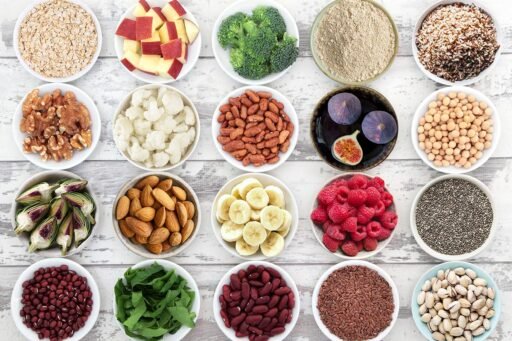Skin is often considered the mirror of our health, reflecting not only how we feel but also how well our bodies are functioning on the inside. While skincare products certainly have their place in maintaining a healthy complexion, one of the most powerful factors in skin health is nutrition. The nutrients we consume play a significant role in supporting skin structure, hydration, and repair, and can even help prevent or alleviate many common skin issues.
In this in-depth exploration, we will delve into the essential nutrients that impact your skin’s appearance, how they function in your body, and the role that diet plays in promoting youthful, radiant skin. With a focus on the key foods and nutrients that support skin health, as well as advice on avoiding dietary pitfalls, this article aims to provide you with a comprehensive guide to using nutrition to improve your complexion.
How Diet Influences Skin Health
Our skin is constantly exposed to environmental stressors like pollution, UV rays, and harsh weather, which can damage its structure and appearance over time. The foods we eat contain vital nutrients that can either support the skin’s ability to defend against such damage or contribute to skin issues.
When we nourish our bodies with the right nutrients, our skin becomes more resilient and is better equipped to repair itself. Nutrients like antioxidants, healthy fats, vitamins, and minerals can protect the skin from oxidative damage, support its moisture balance, and even promote collagen production. On the other hand, poor nutrition can lead to issues like inflammation, breakouts, dryness, and premature aging.
Essential Nutrients for Healthy Skin
The foods you eat serve as building blocks for your skin’s health. While there are many nutrients that contribute to glowing, youthful skin, there are a few key vitamins and minerals that have particularly strong benefits.
1. Vitamin C: The Antioxidant Powerhouse
Vitamin C, or ascorbic acid, is a water-soluble vitamin known for its potent antioxidant properties. It is vital for collagen production, which is essential for maintaining the skin’s firmness and elasticity. Collagen acts as the skin’s structural scaffold, keeping it plump and youthful. As we age, collagen production decreases, leading to the formation of wrinkles and sagging skin.
Vitamin C also protects the skin from free radical damage caused by UV exposure, pollution, and environmental toxins. These free radicals break down collagen and accelerate skin aging. By neutralizing free radicals, vitamin C helps prevent premature aging and reduces the appearance of fine lines and wrinkles.
Good sources of vitamin C include citrus fruits like oranges, grapefruits, and lemons, as well as strawberries, kiwi, bell peppers, broccoli, and spinach. Consuming these foods regularly can help brighten the complexion and protect against signs of aging.
2. Vitamin E: The Skin’s Protector
Vitamin E is another powerful antioxidant that plays a crucial role in protecting the skin from oxidative stress and UV-induced damage. It helps to maintain the skin’s moisture balance by preventing water loss and strengthening the skin’s barrier. Additionally, vitamin E can soothe irritated or inflamed skin, making it beneficial for conditions like eczema or psoriasis.
Rich sources of vitamin E include almonds, sunflower seeds, hazelnuts, spinach, and avocados. By incorporating these foods into your diet, you can enhance your skin’s hydration levels and promote a healthy, glowing complexion.
3. Omega-3 Fatty Acids: Hydration and Inflammation Control
Omega-3 fatty acids are essential fats that support the skin’s lipid barrier, which helps lock moisture into the skin and keeps irritants and pollutants out. A healthy lipid barrier leads to better skin hydration, which is key to maintaining smooth, supple skin. Omega-3s also possess anti-inflammatory properties, which can reduce the risk of skin conditions like acne, eczema, and rosacea.
To boost your omega-3 intake, include foods such as fatty fish (salmon, mackerel, sardines), flaxseeds, chia seeds, walnuts, and hemp seeds in your diet. These omega-3-rich foods can help keep your skin smooth, nourished, and less prone to irritation.
4. Zinc: A Mineral for Healing and Acne Prevention
Zinc is an essential trace mineral that supports skin healing, reduces inflammation, and regulates oil production in the skin. It is particularly beneficial for acne-prone skin, as it helps prevent clogged pores and excessive sebum production, which are two main causes of breakouts.
In addition to its acne-fighting properties, zinc promotes the repair of skin tissues, making it important for healing wounds, cuts, and other skin irritations. Zinc-rich foods include pumpkin seeds, chickpeas, lentils, oysters, beef, and fortified cereals.
5. Biotin (Vitamin B7): Strengthening the Skin’s Barrier
Biotin, also known as vitamin B7, is a water-soluble B-vitamin that is essential for maintaining the health of your skin, hair, and nails. It plays a key role in strengthening the skin’s protective barrier, helping it retain moisture and avoid dryness. Biotin also supports the production of fatty acids, which help keep the skin hydrated and soft.
Biotin is found in foods like eggs, almonds, sweet potatoes, spinach, and cauliflower. By adding biotin-rich foods to your diet, you can support your skin’s ability to stay nourished and prevent dry patches or irritation.
6. Vitamin A: For Healthy Skin Turnover
Vitamin A, in its active form as retinoid, is a critical nutrient for skin health. It supports cellular turnover, meaning it helps skin cells regenerate and shed old, dead cells. This process is vital for preventing clogged pores, reducing the appearance of wrinkles, and promoting an even skin tone. Vitamin A also supports skin hydration by regulating moisture retention.
The best sources of vitamin A are animal-based foods like liver, eggs, and dairy products, as well as plant-based sources rich in beta-carotene, such as carrots, sweet potatoes, spinach, and kale.
The Role of Hydration in Skin Health
In addition to nourishing your skin with essential nutrients, hydration is another cornerstone of healthy, glowing skin. Water is crucial for maintaining the skin’s elasticity, promoting detoxification, and ensuring that nutrients are transported effectively to the skin cells.
Dehydrated skin can appear dull, flaky, and more prone to fine lines and wrinkles. To keep your skin well-hydrated, make sure to drink plenty of water throughout the day—aim for at least eight 8-ounce glasses (64 ounces) of water per day. Additionally, foods with high water content, such as cucumbers, watermelon, and oranges, can help boost your hydration levels.
Foods to Avoid for Clearer, Healthier Skin
Just as there are foods that benefit your skin, there are also certain foods that can cause or exacerbate skin problems. While the impact of diet on skin varies from person to person, some common culprits include:
- Refined Sugars and Carbohydrates: Consuming large amounts of sugar or highly processed carbs can lead to a process called glycation, where sugar molecules bind to collagen and elastin, damaging these fibers and leading to wrinkles and sagging. Excess sugar can also trigger inflammation, contributing to acne and other skin conditions.
- Dairy Products: Some research suggests that dairy, particularly milk, may be linked to acne, possibly due to the hormones present in dairy that can trigger oil production. If you’re prone to breakouts, consider reducing dairy intake and observing how your skin responds.
- Processed and Fried Foods: These foods are typically high in unhealthy fats, sodium, and artificial additives, which can cause inflammation in the body and exacerbate conditions like acne and eczema. Opt for whole, unprocessed foods as much as possible.
Additional Lifestyle Factors for Optimal Skin Health
While nutrition is incredibly important for skin health, a holistic approach that includes other lifestyle factors will yield the best results. These include:
- Sun Protection: Always protect your skin from harmful UV rays by applying sunscreen daily. UV exposure accelerates skin aging and increases the risk of skin cancer. Choose a broad-spectrum sunscreen with an SPF of at least 30.
- Adequate Sleep: Skin repair and regeneration occur during sleep, so aim for 7-9 hours of restful sleep each night. Lack of sleep can lead to dull skin, under-eye circles, and increased sensitivity.
- Stress Management: Chronic stress can lead to increased cortisol levels, which can disrupt the skin’s oil production and cause inflammation. Practice stress-reducing techniques like yoga, meditation, or deep breathing to maintain a calm mind and healthy skin.
Conclusion: Nourish Your Skin from the Inside Out
Nutrition plays a crucial role in achieving and maintaining healthy, glowing skin. By consuming nutrient-dense foods rich in vitamins, antioxidants, healthy fats, and minerals, you can nourish your skin from the inside out and protect it from the many environmental stressors it faces daily. Avoiding processed foods, excessive sugar, and dairy may also help prevent skin issues like acne and inflammation.
Remember, achieving clear and youthful skin is a journey that requires consistency. Combine a nutrient-rich diet with good skincare practices, sun protection, proper hydration, and a healthy lifestyle to see lasting results. By making mindful choices about what you eat, you are giving your skin the best chance to thrive, revealing the natural beauty that lies within.

































Pingback: viagra 25 mg price